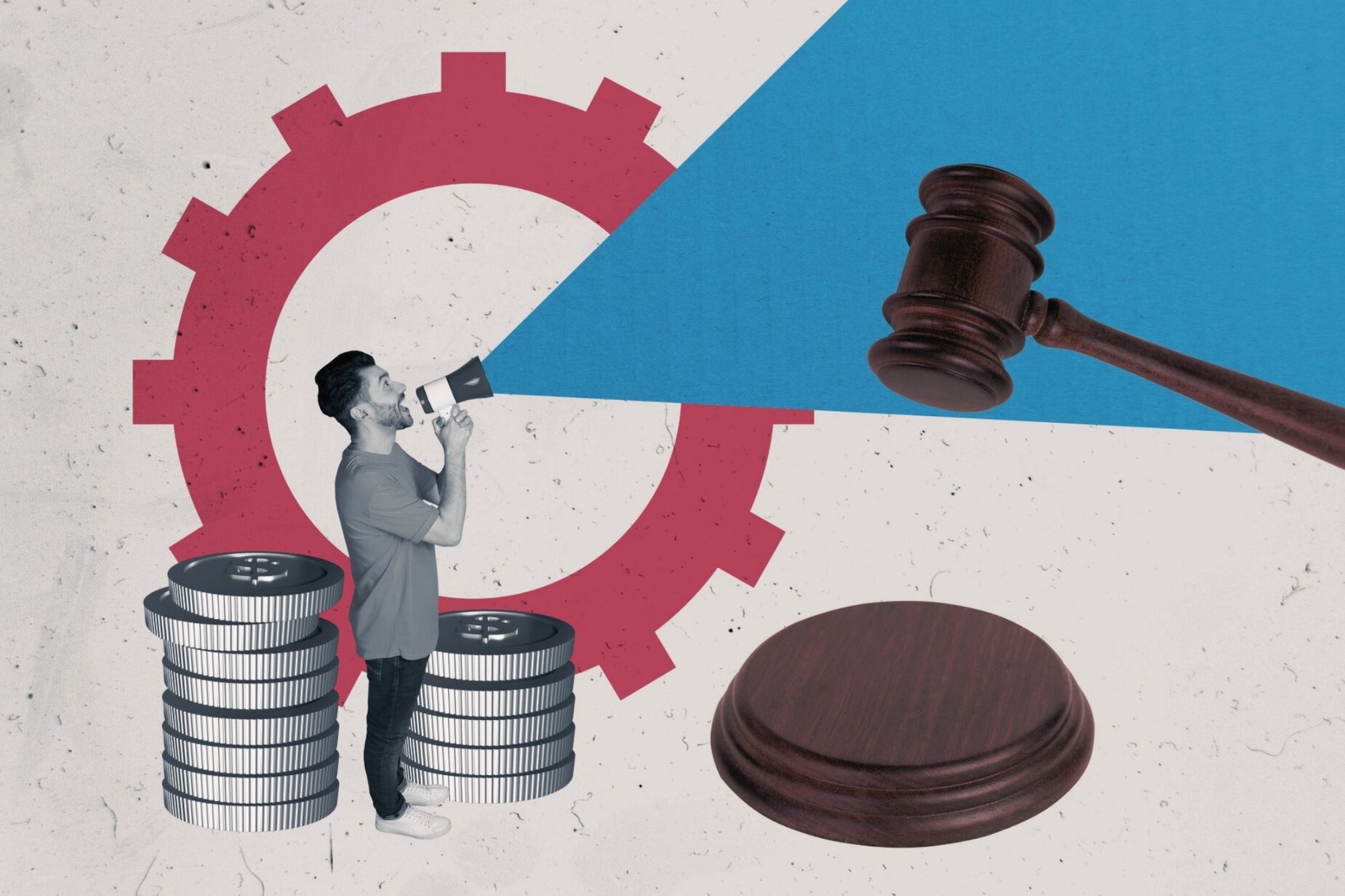Covid-19 revealed the limits of the U.S. economy and the ways it wasn’t as dynamic as many had thought. For years, the U.S. has struggled to build new things, from roads to railways to housing, but analysts have struggled to explain why. But a canonical book by the political economist Mancur Olson offers an answer: As economies age, lobbyists and interest groups slow everything down. Olson’s book The Rise and Decline of Nations is being republished this year, with a new introduction. And it’s sparking a new debate over what went wrong with the U.S. economy.
In April 2020, the venture capitalist Marc Andreessen published a widely read essay titled “It’s Time to Build.” For all its supposed dynamism, the U.S. economy appeared slow and inflexible in the face of a once-in-a-generation crisis. Masks and ventilators were in short supply, but this inability to rapidly adjust wasn’t specific to Covid-19: America had long struggled to build housing, high-speed rail, and zero-emission sources of power, too. Andreessen’s critique crystallized something numerous scholars and commentators had been saying, and it had fans across the political spectrum. There was much less agreement on how we’d gotten here, however. Was it cultural malaise? Broken political institutions? Too much regulation? People seemed to agree that the U.S. had lost some essential dynamism, but couldn’t agree why.
This week, Yale University Press is republishing an old book that claims to have the answer. Mancur Olson’s 1982 The Rise and Decline of Nations is a canonical account of how economies become less flexible and dynamic as they age. In Rise and Decline, Olson argues that the older an economy gets, the more collusion and lobbying it will have, and over time this accumulation of interest groups will corrode an economy by capturing the political process and slowing everything down. The reissue is testament to a rediscovery of Olson’s work by experts in economics and political science, who are contending with many of the same issues Olson grappled with.
In his introduction to the new edition, Harvard economist Edward Glaeser recalls his own long journey back to Rise and Decline. Glaeser first read the book as a graduate student in 1993 and lightly dismissed it. While he found Olson’s logic sound, the writer’s preoccupation with the “stagflation” of the 1970s simply didn’t feel relevant to the boom times of post-Reagan America. But as he studied the economics of cities, Olson’s ideas started to come back to him. Glaeser’s research showed that the most vibrant, productive parts of the U.S. — cities like New York, Boston, and San Francisco — were refusing to build new housing. That drove up the cost of living and prevented new people from moving there. Opposition to new construction was strangling the entire country’s growth, and the book Glaeser had dismissed in graduate school purported to explain why: Maybe America was struggling to build because a vast array of interest groups were inserting themselves in the process, slowing down decision making and using public policy to defend their interests at the expense of the common good.
Olson was obsessed with the logic of interest groups. The main barrier to a group of people joining together to advance a common interest, he thought, was the free rider problem: Each member would prefer the group to exist but prefers not to personally invest time and money getting it started. Without some enforcement mechanism — like mandatory dues in a union — no one steps up because it’ll cost them a lot and they’ll gain just a little. Smaller groups have an easier time overcoming this issue, he argued. If there are only five big tractor makers, each one gets a fifth of the total benefit of forming a tractor lobby, which is often enough to cooperate. By contrast, organizing consumers is harder, because each individual can expect to gain only a tiny fraction of the payoffs for their effort.
Olson also argued that interest groups have an incentive to try and get more of the existing economic pie for themselves rather than to grow it. In Rise and Decline, he wrote that “The familiar image of slicing the social pie does not really capture the essence of the situation; it is perhaps better to think of wrestlers struggling over the contents of a china shop.”
So small, homogenous groups would organize. Large, diverse groups would struggle to organize. And the small, organized groups would then lobby to get the rules of the economy tilted in their favor — at everyone else’s expense. (These ideas were the focus of his earlier book, The Logic of Collective Action.)
In Rise and Decline, Olson added one more provocative premise: The longer a society is stable and prosperous, the more time there is for special interests to overcome the barriers to organizing. And as the number of organized lobbies grows, they collectively “slow down a society’s capacity to adopt new technologies and to reallocate resources in response to changing conditions and thereby reduce the rate of economic growth.” Olson’s renewed relevance stems from the fact that his diagnosis matches Andreessen’s critique: The U.S. economy is inflexible and stagnant because so many special interest groups have had time to form and amass power.
Olson believed his theory helped explain why the U.S. and the UK were struggling at the time he was writing, while Japan and Germany were growing rapidly. World War II hadn’t just ended lives and destroyed factories and machinery; it had swept away the organized lobbies that build up over time in any economy and throttle its growth. The losers of the Second World War were starting over economically, and so weren’t held back by collusion and lobbying. In the U.S., the theory helped explain why New York City nearly went bankrupt in 1975 while the economies of the Western states soared. Growth happened in places where interest groups hadn’t yet had a chance to form.
Today, as the U.S. limps from crisis to crisis, amid slow productivity growth, high inequality, and increasing political dysfunction, Olson’s critique feels urgently relevant. “Thirty years later Olson seems prescient, and I seem naive,” Glaeser writes in his introduction. “America (and most of the wealthy world) has evolved in exactly the manner that Olson predicted. Interest groups, such as homeowners who block new construction and retirees who oppose any cost-saving reform of Medicare, have become ever more entrenched. Regulations that protect insiders, such as occupational licensing requirements for interior decorators and florists, have proliferated. New business formation plummeted between the 1980s and the 2010s.”
Olson has adherents across the political spectrum. Last year, the libertarian economist Alex Tabarrok used Rise and Decline to explain the policy failures of liberal U.S. cities. In 2019, the left-leaning political scientist Henry Farrell cited the book to explain Elizabeth Warren’s worldview:
[W]hat Elizabeth Warren is pursuing is very much an Olsonian view of how markets work: that drag and dross and corruption builds up and that in order to allow markets to achieve their full potential, you basically need to cleanse them at a certain point.
(And swinging back to the right, it’s hard not to think of “Drain the swamp” reading that diagnosis.)
But was Olson actually right? As intriguing as his thesis is, it has both methodological and empirical weaknesses.
Olson was ahead of his time in his use of game theory, which models the strategic interactions of rational individuals. But since then, economics has become more empirical and behavioral, too — and as a result it is appropriately more humble about drawing sweeping conclusions from presumptions of rationality.
For example, in 2009 the political economist Elinor Ostrom won a Nobel Prize for documenting the ways people deviated from narrow conceptions of rationality to cooperate with one another. She found that when groups could communicate and could form and assess each other’s reputations, they were able overcome coordination challenges very similar to the ones Olson was writing about. It turns out that the logic Olson laid out for when groups do or don’t organize only holds under certain circumstances.
Then there’s the fact that the single biggest geopolitical event of the last 40 years seems to directly cut against Olson’s theory. The fall of the Soviet Union in 1991 is exactly the sort of shock to stability, prosperity, and political boundaries that Olson saw as wiping away interest groups. But the result was not economic dynamism — it was the rapid rise of one of the world’s most notorious oligarchies. Either factions aren’t so easily swept away, even in severe crises, or time is not as crucial for forming interest groups; either way Olson’s theory doesn’t seem to fit. (Olson gave an account of the post-Soviet economies’ struggles here.)
For these reasons, Rise and Decline is best read not as a precise account of the problems facing the U.S. economy but as a hypothesis or even a provocation. Many other good books have documented the corrupting power of organized interest groups — especially those representing businesses — and how they corrode an economy. Returning to Olson means returning to the question of how and why these groups form in the first place. And it raises the idea, however speculative, that these interest groups exact an even greater toll on an economy as it grows older. If nothing else, it’s well worth reading to see one of the greatest political economists of the past 50 years try to think through many of the very problems now making headlines.
For his part, Olson was open about the limits to his analysis. His theory was sweeping, but he knew it didn’t explain everything. And he was well aware that people didn’t always hew to the maxims of game theory. He writes in Rise and Decline that “zealots” and “fanatics” will be willing to organize because they aren’t concerned about the ROI. That means, effectively, that in Olson’s world the most influential players in economic policy will be the selfishly rational and the fanatically irrational. That doesn’t sound too far off.


















